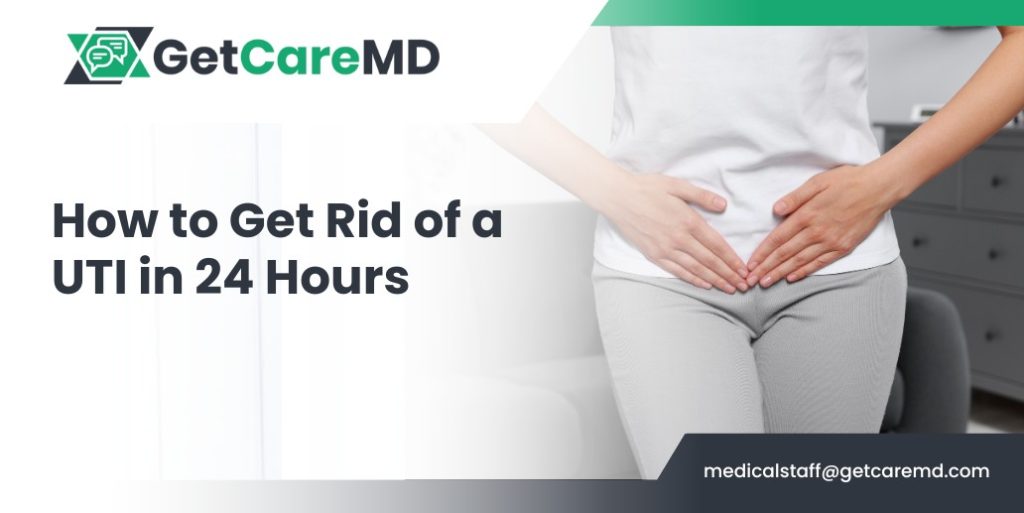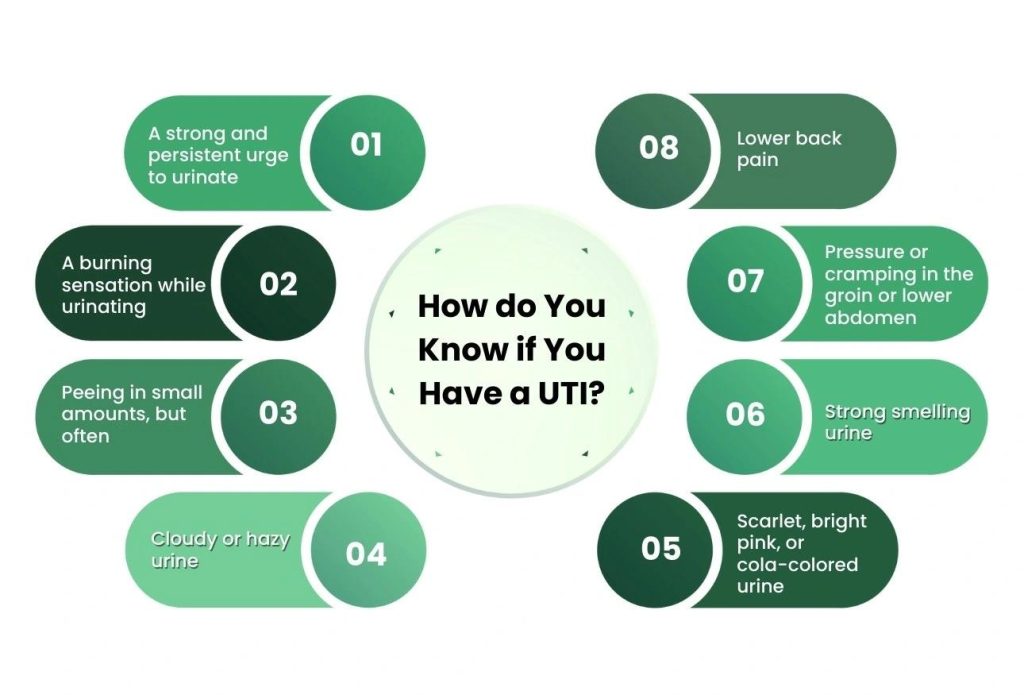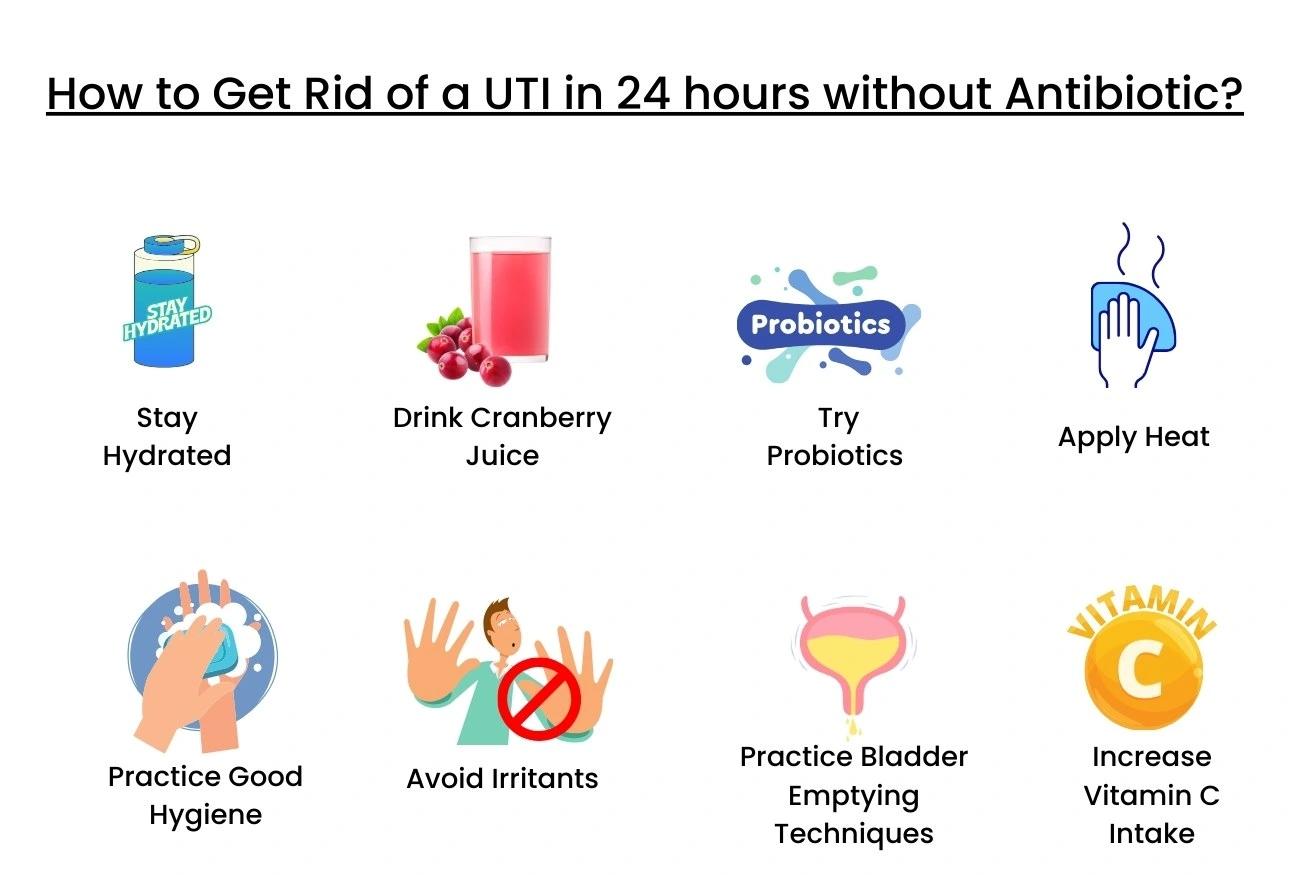Urinary Tract Infections (UTIs) are a common and often painful condition that can affect anyone, but they are especially prevalent among women. Understanding how to get rid of a UTI in 24 hours can be crucial for those seeking quick relief without medication. While medical treatment is often necessary, there are natural methods that can provide instant UTI relief and help alleviate symptoms swiftly.
This blog explores effective, home-based strategies to combat UTIs and ensure comfort within a day. Whether you are experiencing your first UTI or dealing with recurrent infections, these tips can be a valuable resource for managing the discomfort and promoting urinary health.
What is a UTI?
A Urinary Tract Infection (UTI) is an infection that occurs in any part of the urinary system, which includes the kidneys, bladder, ureters, and urethra. Most UTIs involve the lower urinary tract, which comprises the bladder and the urethra. These infections are typically caused by bacteria, most commonly Escherichia coli (E. coli), which enter the urinary tract through the urethra and begin to multiply in the bladder.
Symptoms of a UTI can include a strong, persistent urge to urinate, a burning sensation during urination, cloudy or strong-smelling urine, and pelvic pain. Although UTIs can affect anyone, women are particularly susceptible due to their shorter urethra, which allows bacteria quicker access to the bladder.
How do You Know if You Have a UTI?
Recognizing the signs of a UTI is crucial for early treatment and relief. UTIs often present with a variety of symptoms that can range from mildly uncomfortable to severely painful. Being aware of these symptoms can help you seek timely and appropriate care. Here are some common indicators that you might have a UTI:
A strong and persistent urge to urinate
- A burning sensation while urinating
- Peeing in small amounts, but often
- Cloudy or hazy urine
- Scarlet, bright pink, or cola-colored urine
- Strong smelling urine
- Pressure or cramping in the groin or lower abdomen
- Lower back pain
If you experience any of these symptoms, it is important to take them seriously and consider seeking medical advice or trying home remedies for relief.
Can a UTI Go Away on Its Own?
While some UTIs may resolve on their own, it’s essential to be cautious and attentive to your body’s signals. If you are not pregnant or at a higher risk of complications from a UTI, you might consider waiting a couple of days to see if your symptoms improve before starting antibiotics.
However, it’s crucial to monitor your condition closely during this time. If your symptoms persist or worsen after a couple of days, it’s a clear sign that medical intervention, including antibiotic treatment, may be necessary. Delaying treatment can be risky, especially if the infection progresses or spreads to your kidneys.
Seek medical care immediately if you experience symptoms such as fever, chills, nausea, vomiting, back pain, blood in your urine, severe pain while urinating, changes in urine color, or changes in urination frequency. Your health should always be a top priority, and prompt treatment is essential for preventing complications associated with UTIs.
How to Get Rid of a UTI in 24 hours without Antibiotic?
If you are seeking to alleviate the discomfort of a UTI within a 24-hour timeframe without resorting to antibiotics, there are several natural remedies and self-care strategies you can try. While antibiotics are often prescribed for UTIs, some individuals may prefer to explore alternative methods or complement medical treatment with home remedies.
Here’s how you can potentially get rid of a UTI within 24 hours for both males and females:
 1. Stay Hydrated
1. Stay Hydrated
One of the simplest yet most effective ways to help flush out bacteria from your urinary tract is by staying well-hydrated. Aim to drink plenty of water throughout the day to help dilute your urine and promote frequent urination, which can help to expel bacteria from your system.
2. Drink Cranberry Juice
Cranberry juice is often touted as a natural remedy for UTIs due to its potential ability to prevent bacteria from adhering to the walls of the urinary tract. Consuming unsweetened cranberry juice or taking cranberry supplements may help inhibit the growth of bacteria and support urinary tract health.
3. Try Probiotics
Probiotics are beneficial bacteria that can help restore the natural balance of microorganisms in your body, including those in your urinary tract. Consuming probiotic-rich foods like yogurt or taking probiotic supplements may help promote urinary tract health and reduce the risk of UTIs.
4. Apply Heat
Applying heat to your lower abdomen or back can help alleviate the discomfort associated with a UTI. Using a heating pad or taking a warm bath may help soothe pelvic pain and reduce muscle tension, providing temporary relief from UTI symptoms.
5. Practice Good Hygiene
Maintaining good hygiene practices can help prevent UTIs and support recovery if you’re experiencing symptoms. Be sure to wipe from front to back after using the bathroom, wear breathable cotton underwear, and urinate before and after sexual activity to help flush out bacteria from your urinary tract.
6. Avoid Irritants
Certain substances can irritate the bladder and worsen UTI symptoms. Avoid consuming alcohol, caffeine, spicy foods, and artificial sweeteners, as these may exacerbate urinary discomfort and irritation. Additionally, refrain from using irritating products like douches, feminine hygiene sprays, and scented bath products.
7. Increase Vitamin C Intake
Vitamin C is known for its immune-boosting properties and its ability to acidify urine, creating an environment less favorable for bacterial growth. Incorporating vitamin C-rich foods such as oranges, strawberries, bell peppers, and kiwi into your diet may help support your body’s natural defenses against UTIs and promote faster recovery.
8. Practice Bladder Emptying Techniques
Incomplete bladder emptying can contribute to UTI development and prolong symptoms. To ensure thorough bladder emptying, try double voiding by urinating, waiting a few moments, and then attempting to urinate again.
Additionally, avoid holding urine for extended periods and empty your bladder fully each time you urinate to help flush out bacteria and reduce the risk of reinfection.
Prevention Tips
Preventing UTIs involves adopting healthy habits and lifestyle choices that support urinary tract health. Here are some tips to help reduce your risk of developing a UTI:
- Reduce consumption of coffee, alcohol, and sugary drinks.
- Avoid douching, as it can disrupt the natural balance of bacteria in the vagina.
- Opt for unscented menstrual products to avoid potential irritants.
- Use mild or no soap when cleaning the genital area to prevent irritation.
- Always wipe from front to back after using the bathroom to prevent bacteria from entering the urethra.
- Change menstrual and incontinence pads frequently to maintain cleanliness.
- Empty your bladder after sexual activity to flush out any bacteria that may have been introduced.
- Ensure hands and sex toys are clean before touching the genitals, especially if they’ve come into contact with the anus.
- Avoid using spermicides, as they can irritate the genital area and increase UTI risk.
Maintain a healthy body weight to support overall immune function and urinary tract health.
The Bottom Line
While getting rid of a UTI within 24 hours without antibiotics may not always be feasible, there are several natural remedies and preventive measures you can take to alleviate symptoms and reduce your risk of recurrence. By staying hydrated, practicing good hygiene, incorporating supplements like cranberry and probiotics into your routine, and adopting healthy lifestyle habits, you can support urinary tract health and potentially speed up recovery.
However, it’s important to listen to your body and seek medical attention if your symptoms persist or worsen. Remember, your health and well-being are paramount, and with the right approach, managing UTIs can become more manageable over time.


 A strong and persistent urge to urinate
A strong and persistent urge to urinate 1. Stay Hydrated
1. Stay Hydrated